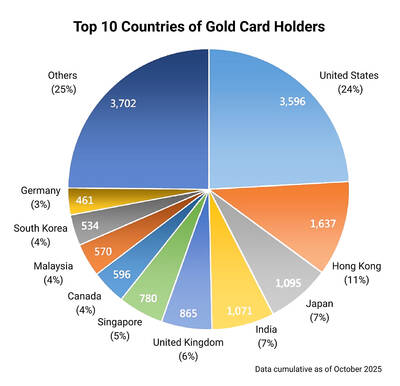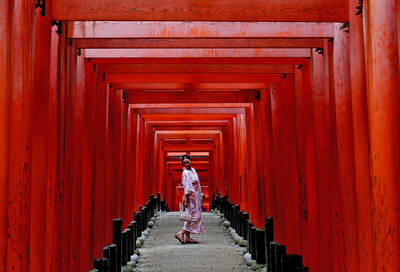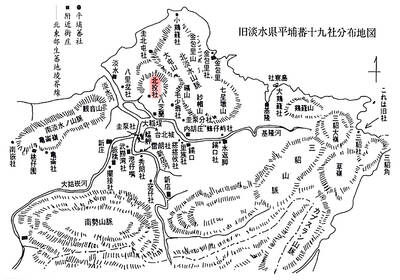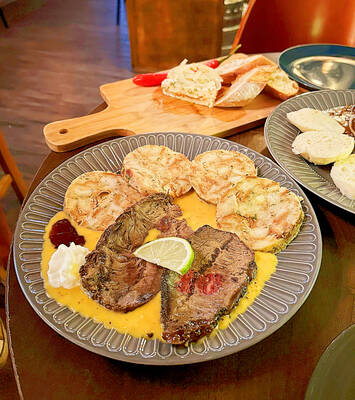The Beijing Olympics came to an explosive end on Sunday night with Chinese director Zhang Yimou’s (張藝謀) less-than-creative closing ceremony. There was a massive fireworks display and hundreds of performers. More than 60 pop stars also took part in the extravagant festivities, with entertainment big shots including Jackie Chan (成龍), Andy Lau (劉德華), Wang Lee-hom (王力宏) and Emil Chow (周華健) all battling to get camera time as they sang songs with schmaltzy titles such as Beijing, Beijing, I Love Beijing (北京,北京,我愛北京).
Though the average screen time for each of these A-list stars was less than one minute, gossip columnists where not slow to point out that they did better than the artists taking part in the opening ceremony, who got no screen time at all due to its sheer length. The Liberty Times (the Taipei Times’ sister newspaper) caustically commented on the “ambient sounds that served to see off tens of thousands as they vacated the stadium,” to describe the concert telecast from the opening ceremony.
“It didn’t feel nice,” said Chan’s actor son Jaycee Chan (房祖名), commenting on Chan’s discontent over his cursory treatment at the closing ceremony by Chinese-speaking media. Chan was on screen for 45 seconds according to figures released by Southcn.com (南方網), a news Web site. This was significantly better than Stefanie Sun (孫燕姿) who, according to the same source, only garnered one second of screen time. Pop Stop knows it must be hard for Chan, especially considering that the aging kung fu superstar is one of China’s most trustworthy ass-kissers.
One of China’s least favorite celebrities, actress Tang Wei (湯唯), became a citizen of Hong Kong on Monday, a change in status that should allow her to continue her acting career, which had stalled following her performance in Lust, Caution (色戒) in 2007. According to a report posted on Internet site Now News (今日新聞), Tang has had bans placed on her appearing on TV and other media because of her steamy performance in that film. As a citizen of the former British colony, it is suggested, she will now be able to pursue her goal of becoming the next Zhang Ziyi (章子怡).
As for Zhang herself, her acting credentials are in danger of being overshadowed by gossip about her relationship with Vivi Nevo, an Israeli capitalist and major shareholder in Time Warner. She is also working the floor with high-society types, and at a charity party held in Beijing last Friday, the 25-year-old star was spotted exerting her charms on Britain’s former prime minister Tony Blair. Even an unintended reunion with ex Huo Qishan (霍啟山) didn’t cause Zhang to lose her cool. The media-savvy star demonstrated how a lady should act in such an unflattering situation. She politely kissed her old flame and passionately hugged his dad, who happens to be a powerful political magnate in China.
Turning to Taiwanese gossip tidbits, CTTV “talent” contest One Million Star (超級星光大道) alumnus Aska Yang (楊宗緯) might once again be a victim of his own arrogance. Promotions for the DVD recording from his May Taipei Arena (台北小巨蛋) concert, which hit record stores two weeks ago, have reportedly been suspended indefinitely due to continuous squabbling between the crooner and his agent Tehsu International (特許國際). Having decided that he didn’t like the terms he had agreed with Tehsu, Yang fired the assistant the agent had assigned to him and hired a lawyer as a go-between. Pop Stop’s advice to the star: don’t overestimate your staying power. Taiwanese consumers are notoriously fickle. Just look at what has happened to Hello Kitty and the craze for egg tarts. Is Yang heading for the same kind of oblivion?

Seven hundred job applications. One interview. Marco Mascaro arrived in Taiwan last year with a PhD in engineering physics and years of experience at a European research center. He thought his Gold Card would guarantee him a foothold in Taiwan’s job market. “It’s marketed as if Taiwan really needs you,” the 33-year-old Italian says. “The reality is that companies here don’t really need us.” The Employment Gold Card was designed to fix Taiwan’s labor shortage by offering foreign professionals a combined resident visa and open work permit valid for three years. But for many, like Mascaro, the welcome mat ends at the door. A

The Western media once again enthusiastically forwarded Beijing’s talking points on Japanese Prime Minister Sanae Takaichi’s comment two weeks ago that an attack by the People’s Republic of China (PRC) on Taiwan was an existential threat to Japan and would trigger Japanese military intervention in defense of Taiwan. The predictable reach for clickbait meant that a string of teachable moments was lost, “like tears in the rain.” Again. The Economist led the way, assigning the blame to the victim. “Takaichi Sanae was bound to rile China sooner rather than later,” the magazine asserted. It then explained: “Japan’s new prime minister is

NOV. 24 to NOV. 30 It wasn’t famine, disaster or war that drove the people of Soansai to flee their homeland, but a blanket-stealing demon. At least that’s how Poan Yu-pie (潘有秘), a resident of the Indigenous settlement of Kipatauw in what is today Taipei’s Beitou District (北投), told it to Japanese anthropologist Kanori Ino in 1897. Unable to sleep out of fear, the villagers built a raft large enough to fit everyone and set sail. They drifted for days before arriving at what is now Shenao Port (深奧) on Taiwan’s north coast,

Divadlo feels like your warm neighborhood slice of home — even if you’ve only ever spent a few days in Prague, like myself. A projector is screening retro animations by Czech director Karel Zeman, the shelves are lined with books and vinyl, and the owner will sit with you to share stories over a glass of pear brandy. The food is also fantastic, not just a new cultural experience but filled with nostalgia, recipes from home and laden with soul-warming carbs, perfect as the weather turns chilly. A Prague native, Kaio Picha has been in Taipei for 13 years and